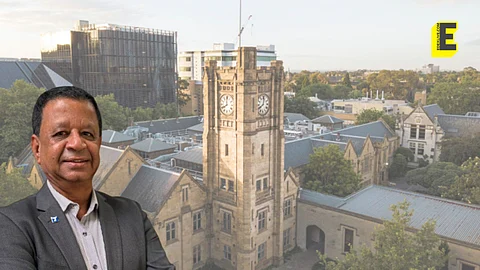

Transnational education (TNE) and transnational research (TNR) are the core of the India-Australia relationship. As India takes on its mammoth educational ambitions, and the University of Melbourne begins an exciting new phase of engagement within India, TNE and TNR will continue to drive our growing relationship and shared opportunities.
Growing up in a small village in Tamil Nadu and working at the University of Melbourne in Australia since 1996, I find myself connected to our two nations' pursuit of academic excellence and societal progress. India is currently experiencing a profound transformation.
With a population surpassing 1.4 billion and the largest tertiary-aged demographic in the world, India has the potential to reach a staggering 126 million university students by 2026.
However, the country's higher education enrolment rate of 28.4% is significantly low, signalling immense opportunities for growth.
Australia is the third most popular destination for Indian students, accounting for 27% of international students after the US and Canada and according to the latest Oxford International Student Mobility Index (SGMI), 34% of all students surveyed expressed a preference for studying in Australia.
In this context, the India-Australia relationship is crucial for the University of Melbourne and one that we are committed to as a long-term priority, as we aim to provide as many students as possible with a pathway to a University of Melbourne experience.
As I take on the role of Director of the Melbourne Global Centre - Delhi, our University’s new home in India, I am committed to strengthening TNE and TNR in India and throughout Asia and the Pacific, to build networks and opportunities for student pathways to a global education — an experience now crucial in our increasingly globalised world.
Currently, 17% of Australia’s international students come from India and Indian students are the third largest represented cohort at the University of Melbourne.
Receiving a global education builds students’ international network, and research has identified that the most effective cumulative learning happens through exposure to a new context, or in this case, a different culture.
Transnational education also contributes to students’ employability — which requires not only human capital, ie technical skills and understanding, but also social and cultural capital, i.e. cultural knowledge and awareness, which is best acquired through diverse social relations and contacts.
It is also estimated that international education generates AU$10 billion in economic value in our home state of Victoria alone* — and with over half a million University of Melbourne alumni worldwide, we know many of our graduates are returning to their home countries to drive local economic growth and innovation too.
Transnational research at the University of Melbourne also fuels our collaborative community programmes in India and our cutting-edge technology that addresses critical issues in education, sustainability, water management, health systems, and agriculture.
There is a brilliance in the alignment and shared outcomes of our collaboration, and these are outcomes incapable under one nation or institution acting alone.
Our pilot Early Childhood Educator programme combines the knowledge of our University and Savitribahi Phule Pune University to upskill the emerging childhood education workforce.
Additionally, our Schools Engagement Program utilises our positive psychology research to support underrepresented secondary school students in India through career guidance and future planning, helping them to understand labour markets and develop their social mobility.
The programme has reached over 70,000 students from diverse backgrounds across various states while helping us build foundational partnerships with the Andhra Pradesh government and industry in India.
We have several dual qualification programmes with institutions in India, such as the Bachelor of Science Dual Degree and Melbourne-India Postgraduate Academy (MIPA) joint PhD programme, educating hundreds already and hopefully thousands more.
Our endeavours are intrinsically linked, and these partnerships have proven the alignment between our nations on the basis of education and research, and the interest from students, graduates and researchers.
The next 12 months will be critical, both for our inaugural year at the Melbourne Global Centre in Delhi and for the India-University of Melbourne relationship as a whole.
Transnational education and research must be acknowledged as a vital part of the DNA of the India-Australia relationship, and my door is always open to universities and institutions who share in this belief.
*Economic Impact of Victorian Public Universities, Calculations on the impact of Victorian public universities on the economy, SPP, June 2024
(Professor Muthupandian Ashokkumar is the Director of Melbourne Global Centre Delhi & Deputy Pro Vice-Chancellor International (South Asia & Middle East) University of Melbourne. Views expressed are his own.)
